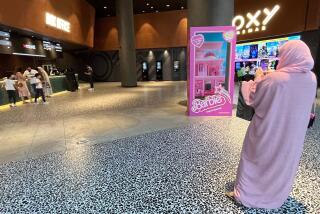Arab nations ban ‘The Attack’ from exhibition
Director Ziad Doueiri hoped his movie “The Attack” might start meaningful conversations about terrorism, especially in the Middle East, where the film is set. Instead, the Lebanese-born filmmaker has seen his drama banned in almost every Arab country, a consequence, he says, of filming in Israel.
Doueiri, whose film premiered at the Telluride Film Festival last year, said “The Attack” was scheduled to roll out in nearly two dozen Arab countries in the weeks ahead of its U.S. premiere on June 21.
But last week he said the League of Arab States, also known as the Arab League, asked all of its 22 member nations to boycott the film.
The ban was not limited to commercial theaters, Doueiri said. He said his wife was warned that if she proceeded with a screening for friends in Beirut she would be arrested. “So we canceled it,” he said.
“The Attack,” adapted from Yasmina Khadra’s novel of the same name, is focused on the Israeli-Palestinian conflict.
An Arab-Israeli doctor (Ali Suliman) working in Tel Aviv discovers that his wife (Reymond Amsalem) has been killed in a suicide bombing that targeted Israeli children. The authorities soon conclude that his wife was the perpetrator, not an innocent victim. The doctor then tries to figure out if his wife had led a double life, and what might have radicalized her.
In shooting part of the movie in Israel, the director said he violated a decades-old Lebanese rule prohibiting citizens from working there. But he said that isn’t really why the film is being banned -- it’s because “The Attack” doesn’t demonize Israel.
“For a lot of Arabs it’s inconceivable to show the other perspective,” said Doueiri, who co-wrote the script with Joelle Touma and departed from the novel’s bleaker ending. “They expect a film from the region to be extremely demonizing of Israel. And I didn’t do that.”
He said Jews were far more supportive of “The Attack,” which has won several film festival awards.
“We knew when we were writing the script that the film was certainly going to provoke debate, but we didn’t write it just to provoke debate,” said Doueiri, who is appealing the Arab League decision. “I thought art was the one way we could all communicate. I guess I was naïve.”
ALSO:
At Telluride fest, two films cast grim eye on Mideast
Forest Whitaker, Orlando Bloom thriller ‘Zulu’ to close Cannes
Is Disney sexing up ‘Brave’ heroine Merida for merchandise line?
More to Read
Only good movies
Get the Indie Focus newsletter, Mark Olsen's weekly guide to the world of cinema.
You may occasionally receive promotional content from the Los Angeles Times.











